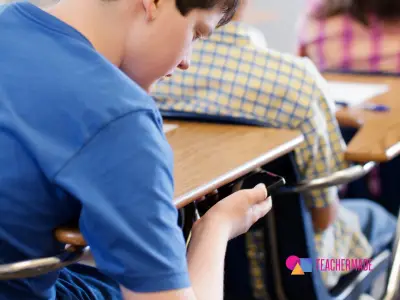Are you looking for the Classworks Special Education program from TouchMath? Click here to go to their site.
Educators immediately understood the gravity of changes occurring with the onset of ChatGPT. They knew that education would be changed forever. ChatGPT makes it easy to generate ideas, and the worry is that students would use it as a crutch.
And while this is true, teachers and students must change their mindsets to adapt to the new digital landscape. Here are some actionable steps to stop ChatGPT cheating and regain new sanity in the AI years

Your best defense against emerging technology is to understand it. This way, you can guide your students through best-use scenarios. To prevent cheating with ChatGPT, teachers can take the following steps:
Explain to students the importance of academic honesty and the consequences of cheating. Help them understand that using AI language models like ChatGPT to gain an unfair advantage is considered cheating.
Set clear guidelines for technology use during exams or assignments. Specify which resources, tools, and platforms are allowed or prohibited. Make it explicit that using AI language models like ChatGPT for exam-related tasks is prohibited.
Clearly communicate the expectations and requirements for each assignment or exam. Provide detailed instructions and a grading rubric that clearly outlines expectations from students and how they will be evaluated. This reduces the temptation to seek external assistance.
During online assessments, employ monitoring tools to detect any suspicious behavior. These tools can track student activity, flag unusual patterns, or identify potential cheating indicators, such as multiple browser tabs open or copying and pasting large amounts of text.
Incorporate a mix of assessment formats, including multiple-choice questions, short-answer questions, essays, presentations, or projects. This diversity makes it more difficult for students to rely solely on ChatGPT or similar tools for answers.
Craft questions and prompts that require critical thinking, personal reflection, or application of concepts rather than simple factual recall. By focusing on higher-order thinking skills, you can create assessments that are less likely to be easily answered with the help of AI language models.
If you are using online assessment platforms, use features that randomize the order of questions or answer options. This makes it harder for students to share specific questions or answers with others who may attempt to use AI models for assistance.
Set time limits for exams or assignments to create a sense of urgency and reduce the likelihood of students relying on external resources like ChatGPT. Time constraints make it more challenging for students to conduct prolonged research or consultation.
Emphasize the importance of using one’s own words and ideas. Encourage students to express their unique perspectives and avoid generic or overly polished responses that may indicate they are relying on AI language models.
ChatGPT is especially frustrating because it can produce entire essays and written answers in seconds. But it doesn’t do so great at citing sources. In fact, it often makes up data through a process of hallucination. So make your students back up their claims.
Cultivate an environment where students feel comfortable seeking help, asking questions, and discussing their challenges. By establishing a positive and open culture, students are less likely to resort to cheating and more likely to seek guidance and support from their teachers.
Consider assigning in-class assignments written by hand. This eliminates the use of AI classroom tech tools. The downside is losing access to grading tools like Google Classroom and TeacherMade.
One of the ways to prevent cheating with ChatGPT is to use and understand it. You can understand AI’s capabilities and limitations. It will also help you design assignments that prevent cheating better.
Within the TeacherMade app, we have added the feature to prevent students from copying/pasting answers into our platform. This small step makes it harder for students to plagiarize using AI. Read more about this feature here.
TeacherMade has made it easier for teachers to import ChatGPT and AI-created materials. Teachers can save time by creating classroom resources. You can upload these new materials to TeacherMade, so your students can complete assignments.